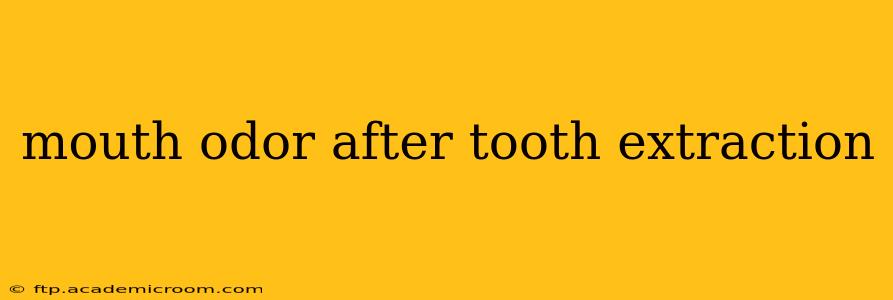Experiencing unpleasant breath after a tooth extraction is a common concern. While it's often temporary, understanding the causes and how to manage it can significantly improve your post-operative comfort. This comprehensive guide explores the reasons behind post-extraction bad breath, offering practical tips for prevention and treatment.
Why Does My Breath Smell Bad After a Tooth Extraction?
Several factors contribute to bad breath following a tooth extraction. Understanding these is crucial for effective management.
-
Blood Clots and Debris: The initial days post-extraction involve blood clot formation in the extraction socket. This clot is vital for healing, but decaying blood and food particles trapped within can lead to unpleasant odors. Proper post-operative care is key to minimizing this.
-
Infection: Infection in the extraction socket is a serious concern and often presents with a foul smell. This is accompanied by other symptoms like increased pain, swelling, and pus. Seek immediate medical attention if you suspect an infection.
-
Dry Socket: This painful condition, also known as alveolar osteitis, occurs when the blood clot is dislodged from the extraction site, exposing the bone. It's characterized by intense pain, bad breath, and a visible empty socket.
-
Poor Oral Hygiene: Neglecting oral hygiene post-extraction can significantly worsen bad breath. While you'll need to be gentle, maintaining cleanliness is paramount.
-
Underlying Medical Conditions: In some cases, persistent bad breath may point to underlying medical issues unrelated to the extraction itself. These could include gum disease, sinus infections, or even certain systemic diseases.
How Long Does Bad Breath Last After Tooth Extraction?
The duration of post-extraction bad breath varies. Generally, mild odor associated with blood clots and debris should subside within a few days with proper care. However, if the odor persists for longer periods or is accompanied by other symptoms like pain and swelling, it's crucial to consult your dentist or oral surgeon.
How to Prevent Bad Breath After Tooth Extraction?
Proactive measures significantly reduce the risk of post-extraction bad breath.
-
Follow Post-Operative Instructions: Strictly adhere to your dentist's instructions regarding rinsing, eating, and oral hygiene.
-
Gentle Rinsing: Use a prescribed mouthwash or saltwater rinse (1/2 teaspoon salt in 8 ounces of warm water) as instructed to gently cleanse the area. Avoid vigorous rinsing that could dislodge the blood clot.
-
Maintain Oral Hygiene: Brush and floss gently around the extraction site, avoiding direct contact with the socket.
-
Healthy Diet: Consume soft, nutritious foods that won't get lodged in the extraction site. Avoid foods that might stick to the wound, such as sticky candies or popcorn.
What Can I Do to Treat Bad Breath After Tooth Extraction?
If you experience bad breath despite following post-operative care, consider these measures:
-
Saltwater Rinses: These are effective in cleansing the area and reducing odor.
-
Prescription Mouthwash: Your dentist might prescribe a therapeutic mouthwash to address infection or promote healing.
-
Over-the-Counter Remedies: Some mouthwashes designed for bad breath can provide temporary relief, but always consult your dentist before using any new products.
-
Professional Dental Care: If the bad breath persists or worsens, schedule an appointment with your dentist or oral surgeon for evaluation and treatment.
Is Bad Breath After Tooth Extraction a Sign of Infection?
Persistent bad breath, especially accompanied by increased pain, swelling, redness, or pus, could indeed indicate an infection. This is a serious complication and necessitates immediate professional attention. Do not delay seeking dental care if you suspect an infection.
Can I Use Mouthwash After Tooth Extraction?
Yes, but only as instructed by your dentist. Some mouthwashes can irritate the extraction site or interfere with healing. They often recommend a saltwater rinse initially, then possibly a prescribed therapeutic mouthwash later in the recovery process. Never use alcohol-based mouthwashes without consulting your dentist.
When Should I See a Dentist About Bad Breath After a Tooth Extraction?
Consult your dentist immediately if you experience:
- Persistent bad breath despite following post-operative care
- Severe or increasing pain
- Swelling or redness around the extraction site
- Pus or discharge from the socket
- Fever
This information is for general knowledge and does not constitute medical advice. Always consult your dentist or oral surgeon for any concerns regarding your oral health. They can provide personalized guidance and ensure proper healing after your tooth extraction.
